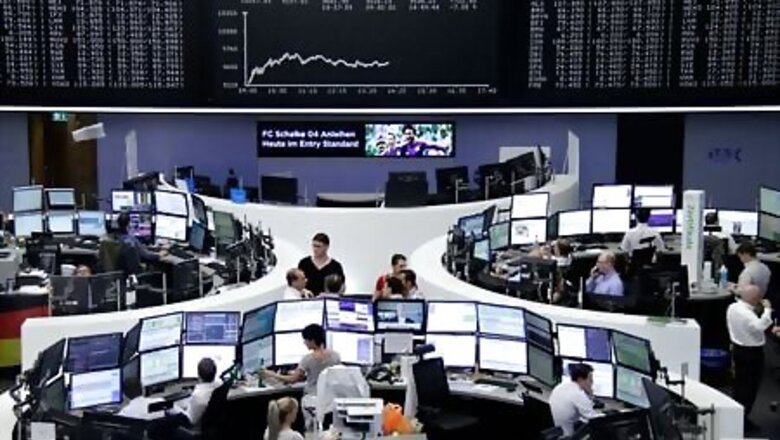
views
LONDON/TOKYO: European shares struggled for momentum on Friday as doubts about extra monetary stimulus and overnight falls in U.S. big tech shares kept investors on edge.
Elevated fears over a messy hard Brexit added to the bearish sentiment, putting sterling on track for its worst-week since March after the European Union told Britain it should urgently scrap a plan to break their divorce treaty.
In other political wrangling, the U.S. Senate on Thursday killed a Republican bill that would have provided around $300 billion in new coronavirus aid, as Democrats seeking far more funding prevented it from advancing.
That followed European Central Bank President Christine Lagarde earlier in the day appearing to rule out measures to weaken the euro.
“Investors were disappointed,” said Milan Cutkovic, market analyst at AxiCorp. “They were hoping that the central bank will boost the stock market rally by paving the way for further stimulus measures and talking down the euro.
“But ECB President Christine Lagarde sounded less dovish, and her remarks about the strong euro left markets unimpressed.”
The pan-European STOXX 600 opened lower before gaining 0.2%. MSCI’s broadest index of Asia-Pacific shares outside Japan added 0.4%, moving away from a one-month trough touched earlier this week. Japan’s Nikkei rose after Tokyo dropped its coronavirus alert by one notch from the highest level as COVID-19 cases trend down.
U.S. futures were higher, pointing to a recovery on Wall Street after losses on Thursday put the S&P 500 and the Nasdaq Composite on course for a second straight week of losses. On Friday, Nasdaq 100 futures were up 1.3% and S&P 500 futures 0.9% firmer.
The NYSE Fang+ index of big 10 tech companies .NYFANG has lost 5.4% so far this week — its biggest weekly loss since the market turmoil in March if sustained by the end of Friday.
Still, the index is more than double its March trough and investors have gathered that their high valuations are justifiable in light of near zero interest rates in much of the developed world and massive liquidity the world’s central banks have created.
Many investors have said the selloff was a healthy correction.
Yet, with the world’s stocks still trading near the most expensive levels relative to profit outlook since the 2000 tech bubble, some analysts called for caution.
“Global shares had rallied on expectations of economic recovery from lockdowns. But as the autumn begins (in the northern hemisphere), people wonder if the coronavirus infections could worsen,” said Kozo Koide, chief economist at Asset Management One.
“You never know if vaccine deployment is that easy nor if banks need to aside more provisions for struggling firms in hospitality sector. Considering all that, investors are likely to question the current valuations can be justified,” he said.
In currency markets, the British pound advanced 0.3% to 1.2840 but stayed flat versus the euro after one of the heaviest selloffs this year sent the pound falling nearly 2% against the euro on Thursday. [FRX]
The European Union is ramping up preparations for a tumultuous end to the four-year Brexit saga after Britain explicitly said this week that it plans to break international law by breaching parts of the Withdrawal Agreement treaty that is signed in January.
After crashing by a record 20% in the second quarter, Britain’s economy grew by 6.6% in July, slower than June’s monthly rate, the Office for National Statistics (ONS) said.
The euro rose slightly on Friday and was last trading up 0.2% at $1.1841 after Thursday’s ECB press conference. But any move higher may be curtailed, however, by ECB chief economist Philip Lane’s warning on Friday that a strong euro will further dampen price pressures.
The U.S. dollar was set for a second week of gains, an index which tracks it against major currencies showed . It gained overnight as U.S. equity market jitters had investors sticking to safer assets.
Government bond yields across the euro area fell after Lane’s comments that inflation will be persistently low in the coming years.
Oil prices were under pressure from a surprise rise in U.S. stockpiles and weak demand due to the coronavirus pandemic.
Brent crude was down 0.4% at $39.91 a barrel after falling nearly 2% on Thursday. U.S. crude dropped 0.2% to $37.23 a barrel, having fallen 2% in the previous session. [O/R]
As the U.S. dollar rebounded, gold was down 0.5% at $1,943.53 per ounce after hitting its best level since Sept. 2 on Thursday. [GOL/]
(Editing by Toby Chopra)
Disclaimer: This post has been auto-published from an agency feed without any modifications to the text and has not been reviewed by an editor



















Comments
0 comment